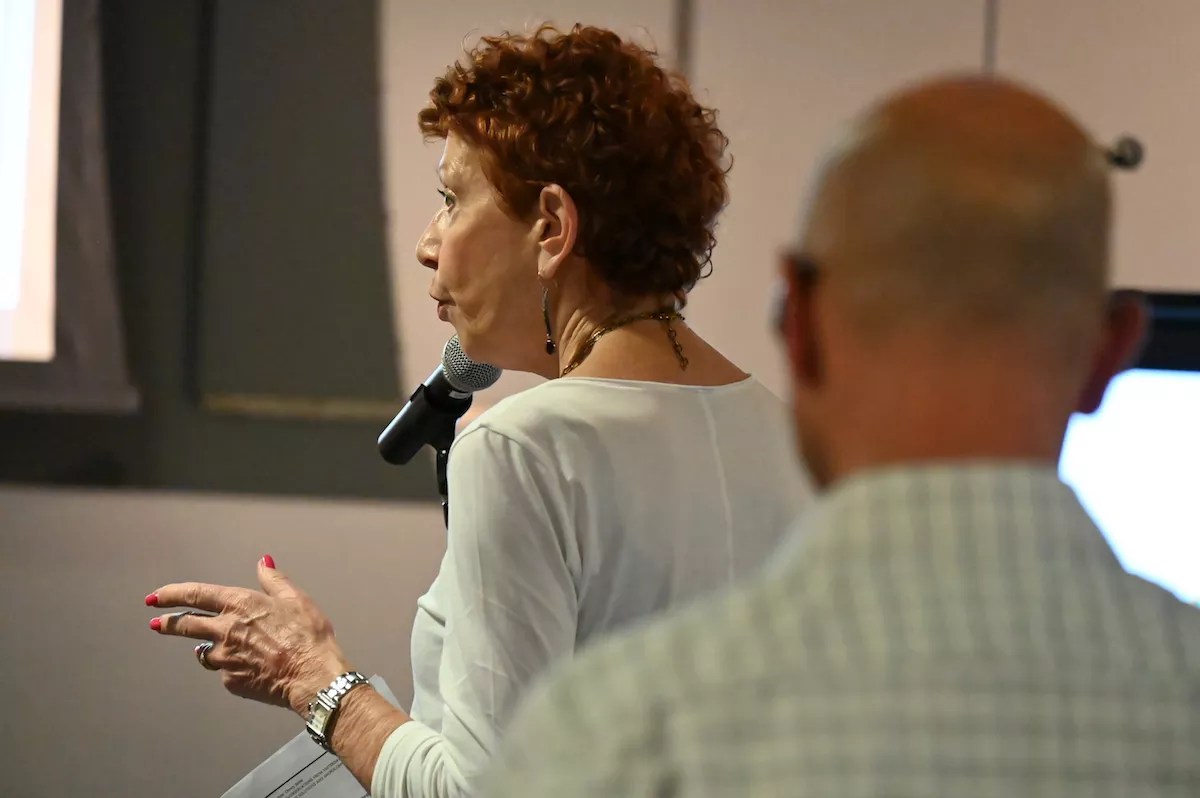
Bennito L. Kelty

Audio By Carbonatix
After nearly four decades in Overland, Estancia Montoya asked for a chance to run her local neighborhood group – the Overland Park Neighborhood Association. Why? Because of one issue: an incoming micro-community.
“I grew up in Overland, and I have a lot of love and passion for our neighborhood and community,” she says. “I’ve been working hard with other residents on the tiny home community project and doing a lot of extra work behind the scenes trying to remove and reduce the impact it will bring to our community.”
OPNA presidents serve three-year terms, unless someone challenges them for their seat. The micro-community being built at 2301 South Santa Fe Drive worried Montoya and her family, who live less a block from the site, and that inspired her to step up and try to unseat Jennifer Grieving, the president, for a bigger say in how Overland handles the situation.
The RNO hosted an election for its president and vice president on Thursday, December 7. Montoya didn’t win, losing to Grieving – the incumbent since 2018 – by a vote of 67 to 21.
The OPNA bylaws allow “everyone who works, lives or owns property in Overland” to be a member, says co-president Jack Unruh, who’s stepping down at the end of the year to let Grieving run the RNO alone.
But the turnout for the election dwarfed the average attendance of OPNA’s monthly meetings, which attract seven or eight members on average, according to Grieving and other residents. Just under a hundred people turned out via Zoom or in person on December 7 – to watch, if not to vote.
“I’m just interested,” says Helene Orr, who is the president of a nearby RNO. “What I see is that more people, because of the micro-community, are more concerned and becoming more involved.”
Orr says her RNO, the Neighbors of Overland North, has also seen a boom in membership and meeting turnouts because of the incoming micro-community.
It’s the reason Daniel Reiling decided to try to unseat Ronnie Crawford from the OPNA’s vice-president position. “I am running because I am a little bit mad at the mayor because he snuck this by all of us,” Reiling says. “A vote for me is a vote for holding the mayor accountable for putting this in our backyards.” Reiling, like Montoya, lost by a wide margin – 58 to 29.
Micro-communities are one of the three main pillars of Mayor Mike Johnston’s plan to end homelessness during his first term, along with converted hotels and leased units. Dozens of shed-like units will be placed in neighborhoods throughout Denver to give homeless residents cleared from encampments a free place to stay while they find a leased unit and begin their path to permanent housing.

Golden Triangle Resident Elaine Kamm talks at a community meeting on September 1.
Bennito L. Kelty
The micro-community in Overland will not open this year, says Joshua Posner, the mayor’s director of strategic initiatives, even though the city had hoped it would open by Friday, December 15, according to the Colorado Village Collaborative, the site’s service provider.
None of the neighborhoods that were announced as future locations for one of Johnston’s ten micro-communities (and one hotel) were consulted ahead of time about taking on the burden, according to residents. But since then, they’ve been invited to participate in town halls to voice their concern. More than a hundred residents have frequently turned out at these meetings.
“I think there is a silver lining,” says Councilmember Flor Alvidrez, who represents the Overland neighborhood. “Community engagement is wonderful. I hope that I see people keep coming, and they keep being involved.”
Other neighborhoods have seen a similar effect.
Alec Baker, a resident near the Holly Hills pocket of southeast Denver, says he and his neighbors were galvanized by the micro-community proposed for 5500 East Yale Avenue, a site that has since been nixed. “Our assumption is that if we weren’t organized, the city would have followed through if we hadn’t voiced our concern,” he says. “Home ownership makes you vulnerable because you’re invested.”
As a result of their involvement in the fight over the micro-community, Baker and his neighbors are still meeting and are now in the process of forming a registered neighborhood organization, to be called the Holly Hills Pocket.
Natalie Jansen’s neighborhood, the Golden Triangle, was worried about hosting two micro-communities, a plan that has since been reduced to one. But she feels like her community has always been more active than most.
Community engagement “probably has increased some, especially since they initially wanted to put two sites in our area,” she says. “However, I think the Golden Triangle residents and businesses have always been involved with community issues.”
Still, Jansen adds, the issue of micro-communities has spurred more involvement “in most neighborhoods.”
Alvidrez, who was elected to her seat this year, notes that Overland had the lowest voter turnout in District 7, but she expects that the micro-community in the neighborhood will turn that trend on its head.
“I’m glad that people are starting to care and engage, because it’s an underrepresented area that doesn’t vote,” she says. “It will probably affect my election, it will probably affect the mayoral election, it will affect maybe the presidential election.”